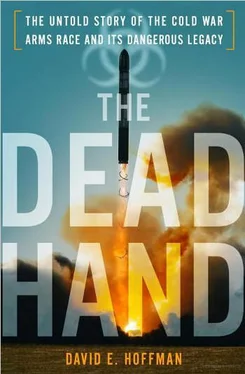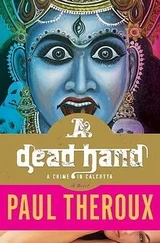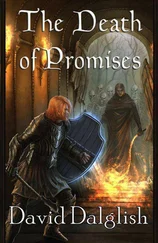The British Secret Intelligence Service responded with alacrity. He was picked up in a car, flown to Heathrow on a British Airways shuttle flight and taken to a remote safe house on the English coast. 6
It was a rather miserable, cold and wet Friday afternoon in London, October 27, 1989. The workday was nearly over and dark had fallen. Christopher Davis, a surgeon commander in the Royal Navy, educated at Oxford and London universities, and the senior biological warfare specialist on the Defense Intelligence Staff, recalled that he was looking forward to the weekend. He had cleared his desk. There was not a piece of paper on it, everything locked away, as required. Then his phone rang around 5 P.M., and his boss, Brian Jones, was on the line.
“Chris, you better come to my office,” Jones said. Davis went to the small office, not much larger than his own. Jones handed Davis a one-page document, a message from the British Secret Intelligence Service, known as MI6, describing the arrival of a Soviet defector, and a brief summary of what the defector was telling them.
“Oh, shit,” Davis said. His eyes were riveted on one word on the page, “plague.” He immediately realized the significance. He told Jones, “The Soviet Union is developing strategic biological weapons. Plague is not a battlefield weapon!” 7
———
In Moscow, Alibek’s secretary rushed into his office on Monday morning. Pasechnik’s deputy, Nikolai Frolov, was on the line from Leningrad and needed to talk to Alibek immediately. Alibek recalled he was so overworked, he felt like putting his head on his desk and going to sleep.
“We’ve got a problem,” Frolov said, sounding strained. “Pasechnik hasn’t come.”
Alibek replied reassuringly, saying it was no problem if Pasechnik was a little late to the meeting of institute directors. “No! No!” Frolov nearly yelled into the phone. “I mean, he hasn’t come back from France!”
Frolov’s account of what happened spilled out in a torrent of excited words, Alibek recalled. In France, Pasechnik had been up all night, lying in bed, fully dressed, before telling his colleague to go on ahead without him. When the colleague got ready to leave for the airport, Pasechnik hugged him and said proshchai , or farewell, rather than the usual do svidaniya , or until we meet again.
“I listened to the entire story with a knot tightening in my stomach,” Alibek said. He went down the hall to see Kalinin, the director of Biopreparat. When told of Pasechnik’s disappearance, Alibek said, it was as if Kalinin had just heard about the death of a close relative. Kalinin went pale. He told Alibek he would call Gorbachev immediately. 8
In the days after he defected, Pasechnik was constantly nervous. He had left his family behind. He was frightened that he would be tried as a war criminal, or pilloried in public, or forced to go back to work on the pathogens, or returned to the Soviet Union. He knew volumes about the research at Biopreparat and was terrified of the British reaction. “It must have been like walking the plank and not knowing if the waters are going to be shark infested or you are going to make it to shore and be okay,” recalled Davis. “That’s what made it all the more brave, I think, in making the decision he could no longer do what he was doing. It was an exceptional move.”
The case was given a code name, Truncate. Davis became one of the two main debriefers, along with a man from MI6, and periodically they were joined by David Kelly, who was head of microbiology at Porton Down, the British chemical and biological defense research facility. Davis was among the small band of allied biological weapons experts who had puzzled for years over Soviet activities. When Pasechnik was interviewed, an invented name was always used, such as “Michael,” but Davis knew Pasechnik’s real identity. They spoke English, although sometimes Davis had to ask for a translation, as when Pasechnik tried to describe a hamadryas baboon. When he wasn’t speaking about the Soviet system, Pasechnik was curious about Britain, asking questions about family life and communities, and marveling, for example, that Kelly had a personal computer at home.
What Davis and his colleague learned from Pasechnik was more revealing than all the fragments of information they had accumulated over the years. “It was an extraordinary moment,” Davis said. “If you’re an intelligence officer, this doesn’t happen but once in a lifetime. Maybe never in a lifetime. It was just one of those exceptional moments. Prior to the time when he came, there were no defections of any note. Neither were there any good, high-level human intelligence sources in place.” He added, “The fact that Vladimir defected was one of the key acts of the entire ending of the Soviet Union and the end of the Cold War. It was the greatest breakthrough we ever had.”
What Pasechnik told them was remarkable. The Soviet Union had not only weaponized classic pathogens, but was seeking to create new agents designed to be resistant to antibiotics and to break down the defenses of the victim. The Soviets were also working on vaccines that would shield their germ warfare operators from harm, and they were developing detectors to sense a possible attack. Not only was there a large program devoted to battlefield weapons, which were for short-range attacks, but the emphasis on plague and smallpox suggested a focus on long-range, strategic weapons. Pasechnik noted that the Soviets had not yet achieved one of their prime goals, the creation of a new biological warfare agent completely resistant to treatment, but the work was still underway.
Pasechnik also revealed how the Soviet program might ultimately be concealed, perhaps with small, mobile laboratories that could never be found. Pasechnik told them about the sprawling network of laboratories and production facilities hidden in Biopreparat that had cost in excess of 1.5 billion rubles over fifteen years and employed tens of thousands of scientists and support workers. He told them how the Interbranch Scientific and Technical Council, where Domaradsky had once worked, was responsible for coordinating and administering the germ warfare effort with money from the military. He revealed that the Soviets had created a system of false financial plans for the institutes, purporting to show they were working on innocent civilian biotechnology projects, in order to cover up the actual military biological weapons work.
While hesitant at first, Pasechnik gained confidence over time, and his knowledge was relayed in a way that was calm and precise. “He was a very frank source,” said Jones. According to Davis, Pasechnik was clear about “what he knew personally, or as a result of data that he was aware of, and what he had been told, and what he had just found out chatting with other people. He never, ever stretched things.”
Only three months after the Politburo commission met in Zaikov’s office to discuss the cover-up, Pasechnik was sitting in Britain, laying the Kremlin’s darkest secrets on the table. His information helped the British draw up a list of twenty excuses the Soviets might use to hide their illegal work. As Pasechnik talked, British policy-makers began to realize that some of their core assumptions in recent decades had been wrong.
Jones, who earned his doctorate in metallurgy, had just two years earlier become head of unit DI-53, which analyzed nuclear, chemical and biological weapons intelligence data, from all sources, for the U.K. Defense Ministry. The focus was overwhelmingly on nuclear weapons materials and chemistry; Jones recalled that his unit had just two people who specialized in chemical and biological warfare. One of them was Davis.
When the British gave up their biological weapons program in the late 1950s, the central assumption then, and since, had been that nuclear weapons were the most effective deterrent. “The same year our nuclear capability became active, we dropped our biological weapons program and chemical weapons program,” Jones said. “Nuclear would do for us.” Then, in the early 1970s, the Biological Weapons Convention was signed; British diplomats played a major role. The popular assumption, he added, was that biological weapons had no utility in modern warfare. “They are not a deterrent, they are difficult to use defensively, they didn’t fit, as it were, into Western perceptions of useful military material,” Jones recalled. An added factor was Nixon’s 1969 decision to close the U.S. program. Jones added, “The Russians had nuclear weapons—why on earth would they need biological weapons?” The British postulated that, if the Soviets were doing anything, it might be trying to create an improved battlefield chemical or biological weapon that would emit toxins, perhaps a sort of hybrid chemical-biological weapon. They assumed such a new weapon would be used for close-in battlefield combat against troops. “There was this idea that this is what the Russians were really after,” Jones said. 9
Читать дальше












